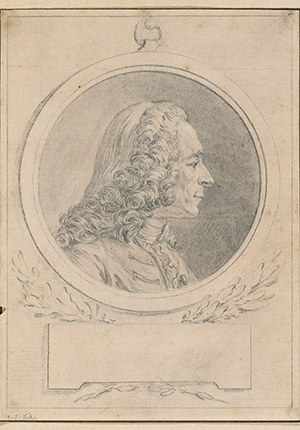Historic Document
Letters concerning the English Nation (1733)
Voltaire | 1733

Digital image courtesy of Getty’s Open Content Program
Summary
François-Marie Arouet, known as Voltaire (1694-1778), was a celebrated French author of a host of tragedies, tales, philosophical works, and polemical tracts. From amongst these tracts, his Letters concerning the English Nation (1733) had the greatest impact in the English-speaking world. His passages on the spirit of commerce, religious diversity, religious freedom, and the English form of government greatly influenced American thinking.
Selected by

Paul Rahe
Professor of History and Charles O. Lee and Louise K. Lee Chair in the Western Heritage at Hillsdale College

Jeffrey Rosen
President and CEO, National Constitution Center

Colleen A. Sheehan
Professor of Politics at the Arizona State University School of Civic and Economic Thought and Leadership
Document Excerpt
Letter 6—Take a view of the Royal Exchange in London, a place more venerable than many courts of justice, where the representatives of all nations meet for the benefit of mankind. There the Jew, the Mahometan, and the Christian transact together, as though they all professed the same religion, and give the name of infidel to none but bankrupts. There the Presbyterian confides in the Anabaptist, and the Churchman depends on the Quaker’s word.
If one religion only were allowed in England, the Government would very possibly become arbitrary; if there were but two, the people would cut one another’s throats; but as there are such a multitude, they all live happy and in peace. . . .
Letter 8—THE members of the English Parliament are fond of comparing themselves to the old Romans. . . .
In my opinion, the majesty of the people of England has nothing in common with that of the people of Rome, much less is there any affinity between their Governments. There is in London a senate, some of the members whereof are accused (doubtless very unjustly) of selling their voices on certain occasions, as was done in Rome; this is the only resemblance. Besides, the two nations appear to me quite opposite in character, with regard both to good and evil. The Romans never knew the dreadful folly of religious wars, an abomination reserved for devout preachers of patience and humility. . . .
But here follows a more essential difference between Rome and England, which gives the advantage entirely to the latter—viz., that the civil wars of Rome ended in slavery, and those of the English in liberty. The English are the only people upon earth who have been able to prescribe limits to the power of kings by resisting them; and who, by a series of struggles, have at last established that wise Government where the Prince is all-powerful to do good, and, at the same time, is restrained from committing evil; where the nobles are great without insolence, though there are no vassals; and where the people share in the Government without confusion.
The House of Lords and that of the Commons divide the legislative power under the king, but the Romans had no such balance. . . . They considered the plebeians as a wild beast, whom it behoved them to let loose upon their neighbours, for fear they should devour their masters. Thus the greatest defect in the Government of the Romans raised them to be conquerors. By being unhappy at home, they triumphed over and possessed themselves of the world, till at last their divisions sunk them to slavery.
The Government of England will never rise to so exalted a pitch of glory, nor will its end be so fatal. The English are not fired with the splendid folly of making conquests, but would only prevent their neighbours from conquering. They are not only jealous of their own liberty, but even of that of other nations.
The English have doubtless purchased their liberties at a very high price, and waded through seas of blood to drown the idol of arbitrary power. Other nations have been involved in as great calamities, and have shed as much blood; but then the blood they spilt in defence of their liberties only enslaved them the more. . . .
Letter 10—AS trade enriched the citizens in England, so it contributed to their freedom, and this freedom on the other side extended their commerce, whence arose the grandeur of the State. Trade raised by insensible degrees the naval power, which gives the English a superiority over the seas, and they now are masters of very near two hundred ships of war. Posterity will very probably be surprised to hear that an island whose only produce is a little lead, tin, fuller’s earth, and coarse wool, should become so powerful by its commerce, as to be able to send, in 1723, three fleets at the same time to three different and far distanced parts of the globe. One before Gibraltar, conquered and still possessed by the English; a second to Portobello, to dispossess the King of Spain of the treasures of the West Indies; and a third into the Baltic, to prevent the Northern Powers from coming to an engagement. . . .
I need not say which is most useful to a nation; a lord, powdered in the tip of the mode, who knows exactly at what o’clock the king rises and goes to bed, and who gives himself airs of grandeur and state, at the same time that he is acting the slave in the ante-chamber of a prime minister; or a merchant, who enriches his country, despatches orders from his countinghouse to Surat and Grand Cairo, and contributes to the wellbeing of the world.




